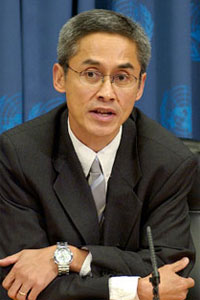
The advent of Covid-19 has accentuated digitalisation and its close linkage with automation, algorithms, and artificial intelligence ("the three A's"). The Asian region interfaces closely with this phenomenon, especially because it is the most populous continent. It is also a region with a large number of non-democracies and semi-democracies. This panorama invites care to prevent misuse of those three As.
What of automation? A key consequence of the pandemic has been the shift to automation. The negative side has been rising unemployment and the question of how to revive access to jobs. Yet, machines are taking over work previously done by humans. A key strategy is to enable the displaced workforce to re-skill. In the meantime, there is the exponential growth of the digital economy which demands a more skilled workforce, while necessitating the nurturing of new professions.
When is automation unable to substitute for the human touch? The book Artificial Intelligence 2041 penned by former Google China's executive, Kai-Fu Lee and sci-fi writer Chen Qiufan, noted that three areas open doors to new types of work: "creativity, empathy and dexterity".
For example, the "empathy industry" would promote people who are needed to offer empathy to other humans. These include social workers, nurses and psychologists dealing with the impact of digitalisation, such as computer-related injuries and mental illnesses. A different kind of service industry has the possibility of emerging.
How then to help those who are out of work and who have yet to find new jobs and activities? Another idea being touted is to offer universal basic income to everyone.
Yet, in UN circles, there is a divergence of opinions on this. Humans need more than such income because we all search for activities that are fulfilling and that enhance our self-esteem and self-actualisation. Thus constructive occupations are still needed even if the state provides some guaranteed financial support. Social protection is also essential to cover access to health care and other supports to enable people to recover and enjoy the basics of life.
What about labour protection and the digital economy? There is a question as to whether "gig workers" who offer digital services from home interlinked with digital platforms are formal workers covered by the labour law. The latter may have to be adjusted to cover these workers explicitly. Hybrid work (work from home alternating with work at the office) is already prevalent in many countries and it also needs monitoring to ensure fair labour practices.
The issue of data and algorithms is all-pervasive today. Algorithms are linked with digital equations and instructions that enable the profiling of consumers in terms of their behaviour and have obvious implications in relation to the marketing of goods targeting that behaviour for commercial reasons.
There are also privacy implications. Today, human rights-conscious countries are increasingly adopting laws on the protection of personal data so as to enable people to safeguard their right to privacy and the need for their consent if their data is to be used. Colloquially, "the right to be forgotten" has emerged as a key concern. It implies that when your data is put on the internet against your will, you can demand their removal from the platform -- "to be forgotten".
What if such data and algorithms are used for criminal purposes? There is now a move towards an international treaty on cybercrimes but this invites caution because it may affect freedom of expression and may be abused especially by non-democratic regimes. The preferred example on this front is the European Convention concerning cybercrimes, known as the "Budapest Convention" to which some Asian countries are parties. Basically, the convention calls for the criminalisation of specific internet-related activities, such as child pornography and fraud on the internet, rather than a general internet law that confers broad powers on the state to block information flow. Currently, a key danger in the Asian region is the emergence of internet gateway laws that enable the authorities to switch off the internet tap all too easily and arbitrarily.
As for the rise of artificial intelligence (AI), it is recognised that robots can contribute much to help humankind. Two areas give rise to worries. A major concern is the use of AI for security and surveillance. An example is facial recognition technology which enables the identity of persons to be singled out, especially in undemocratic settings. Regrettably, street demonstrators are identified remotely by such technology and are harassed by law enforcers and security personnel for repressive purposes. The human rights arm of the UN has already called for a moratorium on the use of such technology and this is especially resonant for Asia.
Finally, there is the arrival of killer robots which need to be regulated. What is most concerning, however, is (self-)automated robots that can decide to attack and kill on their own accord, without being subjected to human command. The UN has also called for international regulation of these weapons. The most logical entry point on this front is to expand a treaty that already exists. The Convention on Conventional Weapons is directly relevant and it prohibits, for example, blinding laser weapons. In future, this treaty might be expanded to prohibit killer robots which act beyond human command. However, many Asian countries have not signed up to the treaty and should be encouraged to do so.
While the three A's have much to contribute to humanity, an existentialist question is whether, in future, that trio will overtake human intellect and know-how. That stage is called "singularity". Yet, there are two areas where those three A's are unlikely to supersede human capacity at least in the short term: consciousness and conscience. Humans still need to be in control and to be accountable; to be "humans in the loop".
Vitit Muntarbhorn is a professor emeritus at the Faculty of Law, Chulalongkorn University. He is the author of the book 'Challenges of International Law in the Asian Region' (Springer 2021).
